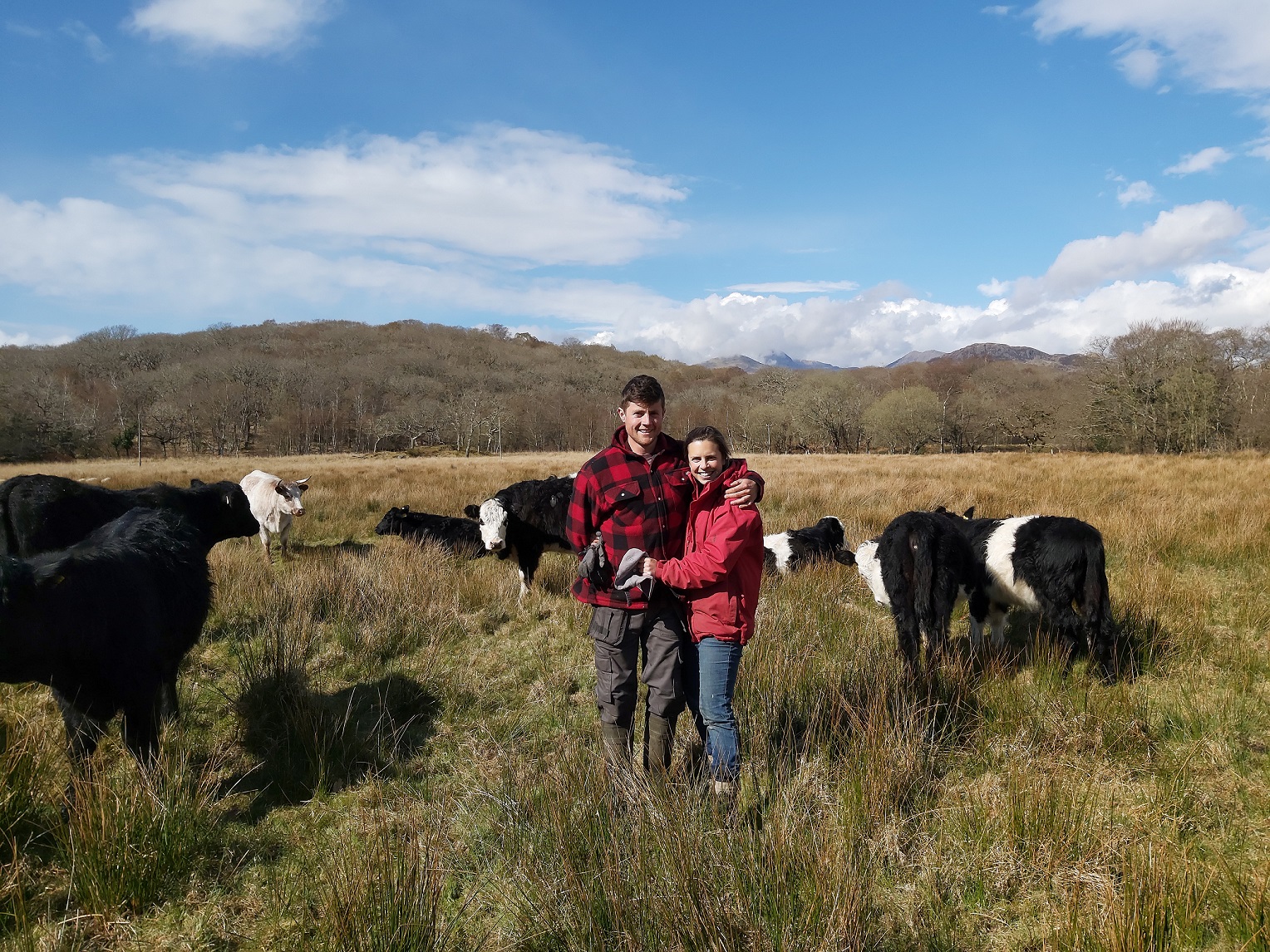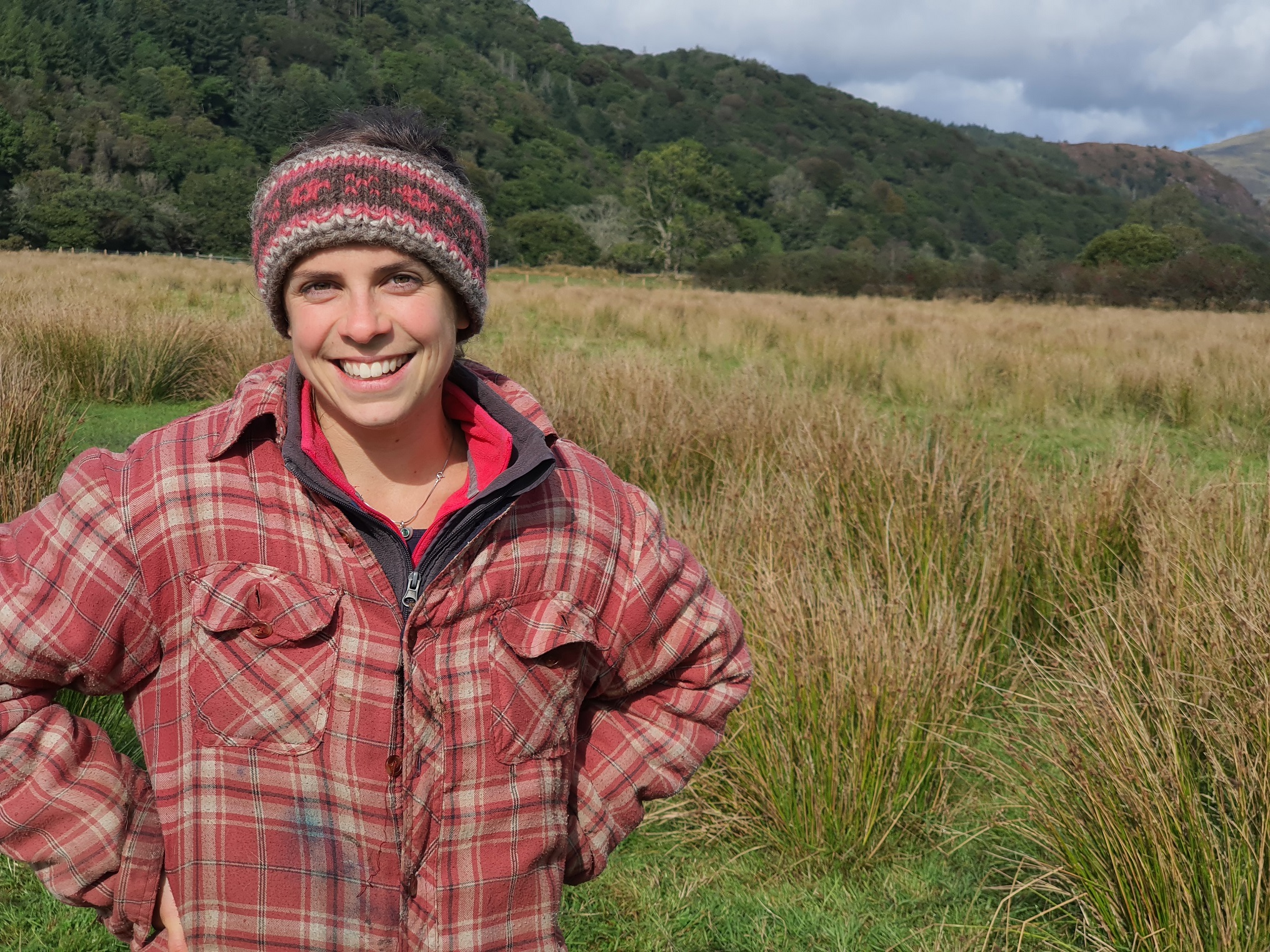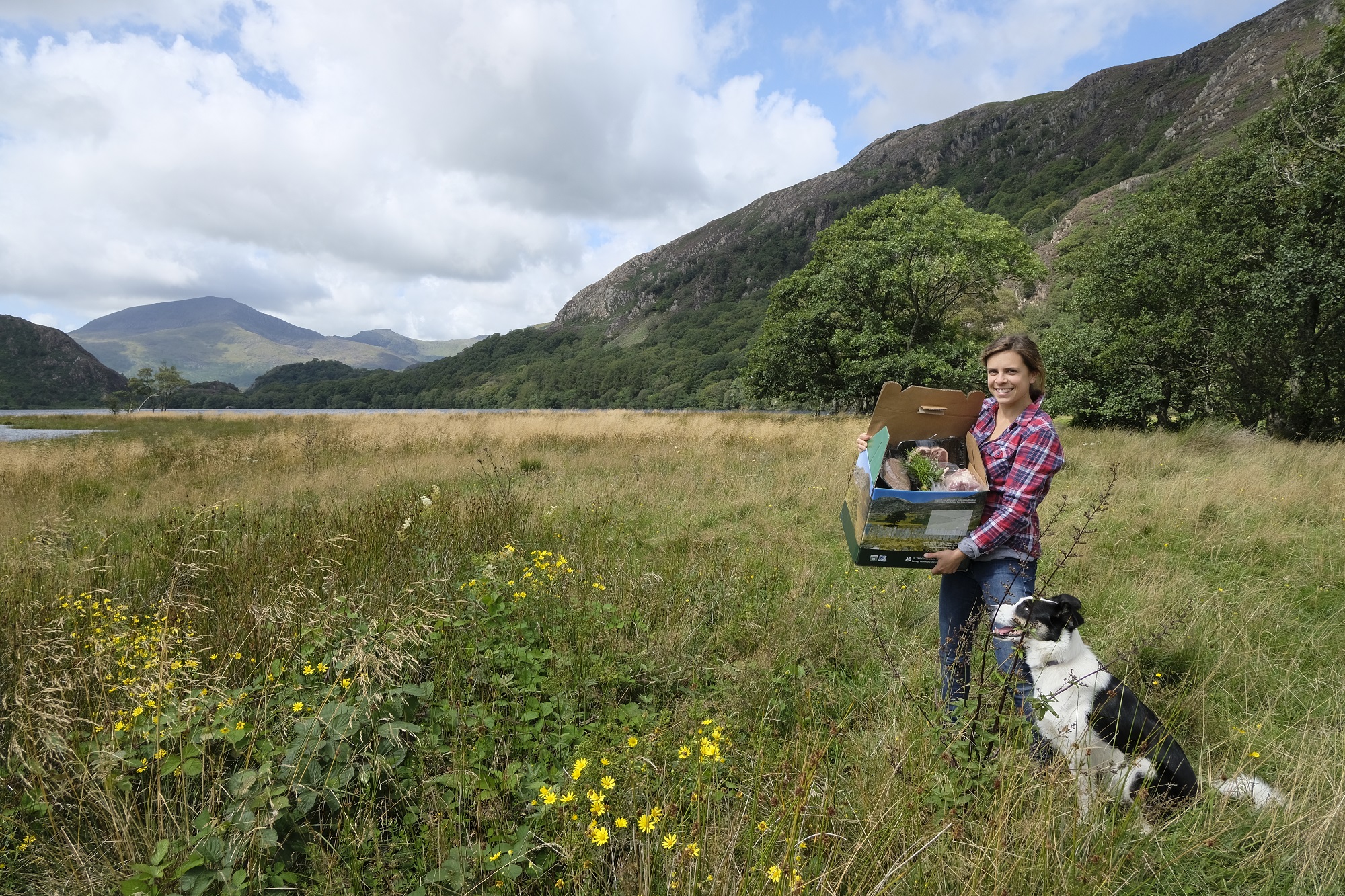 Nestled in the Snowdonia National Park, a few miles from the historic towns of Beddgelert and Penrhyndeudraeth, is Hafod y Llyn Isaf, a National Trust farm. The 110 acres holding is home to husband and wife team Teleri Fielden and Ned Feesey, 100 sheep and 20 cattle.
Nestled in the Snowdonia National Park, a few miles from the historic towns of Beddgelert and Penrhyndeudraeth, is Hafod y Llyn Isaf, a National Trust farm. The 110 acres holding is home to husband and wife team Teleri Fielden and Ned Feesey, 100 sheep and 20 cattle.
The land here is mostly rush pasture and species rich floodplain meadows, as it’s only 3 meters above sea level. Formerly part of the estuary, before the cob was built in Porthmadog, the soil is sandy and presents the young farming couple with some challenges.
Not from a traditional farming background, Teleri and Ned had to prove themselves to their landlords, the National Trust, to be accepted as the tenant farmers here. Through hard work and determination, the couple have secured a 10 year farm business tenancy. Before moving here, Teleri was farming at Llyndy Isaf at Nantgwynant on a scholarship between the National Trust and the YFC. It was meant to be a one year scholarship to help young farmers get a foot on the ladder but she stayed for 3 years running the 600 acre hill farm, with Welsh mountain sheep and Welsh black cattle and a lot of conservation work.
Teleri said: “Neither me nor Ned grew up on a farm so we had to find either a tenancy, share farming agreement or a council holding and thankfully Hafod y Llyn came up the summer I was leaving Llyndy Isaf as the farm scholar there. We applied for it and went through a long application process and eventually were successful.We both however continue to work off farm as well.”
Having taken the farm over in October 2020, the couple are starting from scratch to build up their livestock. “We’re slowly building up our stock. It has been an expensive year for buying sheep - everyone has been celebrating the prices, we weren’t so much! So we were very relieved when we were offered to lease sheep from a nearby farmer wanting to help us out. We're developing a suckler herd and have a real mix of cows. We’re trying to work out which breeds work best for our type of farming system,” explains Teleri.
The farming system is important to Ned and Teleri, with the focus being on conservation whilst producing sustainable, nutritious food. “Conservation grazing is how I got into farming. I’m not the most experienced farmer by a long way or the most skilled, and we don’t have a lot of capital to invest into our system, but most of the farms I have worked on have had an ecological focus. I worked on a research farm in France that was focussed on ecological agriculture. Llyndy was also a National Trust farm and we did a lot of conservation there too,” she says.
The cattle play a crucial role in the land management and conservation aspects here on the farm and the breeds were bought in from other farmers also involved in conservation grazing. “We graze on various ‘SAC’s’ (Special Areas of Conservation) and on a big upland area and within woodlands. We also don’t have any wintering sheds for the cattle so they need to be hardy, calm, easy to gather and able to outwinter. We’ve got belted galloways, herefords, welsh blacks, dexters, shorthorn, shetland, white galloway, white shorthorn - it’s a good mix. We also have Romney and Welsh Mountain sheep,” Teleri explains.
The Conservation grazing done sees a small amount of cattle on a large area to allow regeneration and for trees and shrubs to come through. The animals, Teleri says, are really important to provide a mix of habitats. “The cattle graze certain areas harder than others and leave others.
“It creates a mosaic of habitats in an area, such as open pasture where they’ve grazed and where flowers get the chance to come through, but it still allows succession to happen in other areas. It’s a lot of work, because if you have a small number of cattle in a large area you have to find them. That’s why there is some payment for us to do that in some areas.It’s quite time consuming to search for cattle amongst the brambles but they’re very good at enhancing biodiversity, especially in upland areas that haven’t had cattle on them for a long time,” she says.
The grassland here is species rich and the livestock are part of managing and maintaining the environment. “We use the cattle and sheep to graze at certain times of year and then ensure that the land has a long rest period so that things can flower, get long and for the seedheads to come and then the animals graze it off again.
“We use the animals as conservation tools to improve biodiversity and enhance areas. It keeps that fertility on the ground as well. You can really notice it. Some woodland we graze that hasn’t had animals on it for a very long time and you go there now and there are so many more insects and bugs following the cattle. Their muck is also feeding the soil biota.”
To further improve the farmland for biodiversity and help combat climate change, the National Park has supplied Ned and Teleri with saplings for hedgerows and extra individual trees along boundaries as well. “This winter Ned is going to try putting in a willow stand/ agro forestry into some very rushy pasture. We've got very wet land and they grow so well here. You just take cuttings from them, pop them in the ground and they grow. We’ll try that because we have a selenium and copper deficiency here and willow is supposed to be very good at providing that. Ned says we look like we’re hippy farming but we’ve read about how successful it is in New Zealand, so hopefully it will work!” said Teleri.
With the land being part of the former estuary, the farm sees the effect of climate change first hand. “We are a fairly risky farm in terms of climate change as we are only 3 meters above sea level, and we are very reliant on the Internal Drainage District Board. Since they built the cob in Porthmadog, we are artificially dry but the regularity and severity of the floods we experience here has increased.
 “We can get a hundred year storm every year now. Last year we had terrible trouble with flooding. I always knew it was a wet area because I have previously worked on some land close to this farm. When we got here we had a baptism of fire. The meadows along the river go under fence height water, about 4 foot. You need to be very quick and move the livestock and then fix the fencing after the flood water has gone. You need to be very aware of the river levels and the tide as well, as it impacts the water levels here.
“We can get a hundred year storm every year now. Last year we had terrible trouble with flooding. I always knew it was a wet area because I have previously worked on some land close to this farm. When we got here we had a baptism of fire. The meadows along the river go under fence height water, about 4 foot. You need to be very quick and move the livestock and then fix the fencing after the flood water has gone. You need to be very aware of the river levels and the tide as well, as it impacts the water levels here.
“That’s also why we spend a lot of time and energy on improving the soils here. It’s important that we have beef and sheep here as opposed to crops. The soil here always needs to be covered. It would be risky to plough or reseed here. That soil has to be protected. That’s why we also give the fields a long rest period and make sure there is a good cover on them before we go into winter.
“If the flood comes in fast, you need to move and get the animals out to safety. We are really on the frontline of climate change.”
Whilst the couple are keen conservationists and see the clear benefit of planting trees, they are realistic about what is needed. “This is a very wooded area here and the habitats that are missing are species rich meadows and wildflowers and open wet pastures. It wouldn’t be the best idea to fully plant everything around here with trees and take the money on offer for woodland at the moment. What wildlife needs here is open pasture and flowers and seed heads for the birds. That’s what we’re concentrating on. It fits perfectly with beef and lamb production as well,” explains Teleri.
Before Ned and Teleri took over the running of the farm, the ecologist for the National Trust did a survey of the plants and species on the farm - the results were encouraging. “We have some really amazing birds and species like the Kingfisher, otters, and a barn owl here. We also have an osprey and many of the little things too like Whorled Caraway, a rare plant we have a lot of here actually in the wet pastures. Michaelmas daisies are also rare but we have a few of them. It’s already a nice mix and we’re looking to enhance and improve it,” said Teleri.
Conservation and looking after the land play a crucial role here at Hafod y Llyn Isaf, however, Teleri and Ned are also keen to ensure that food production doesn’t fall by the wayside. “The cattle are doing a great job with the conservation grazing but at the end of the day, the product I can get back from them in terms of money is from the beef and lamb boxes we do, nothing else.
“People want to buy locally and support something that improves the environment as well. The beef boxes have been really successful and that’s very encouraging. We take a bullock to Cig Eryri, the small local family run abattoir and they do the cut and kill and then we label it and distribute them. They go out in 5kg boxes, including mince, burgers, steaks, joints and stewing meats. People buy them locally from the farm or we sometimes use a courier to send them further afield. We do the same for the lamb boxes,” Teleri says.
With a background in marketing, Teleri has put her skills to good use and is adding value to their products. “We have small numbers of stock and a small area of land so it makes sense to add value where we could. People sign up to our mailing list on our website, then get an email when we have meat available.The local Facebook groups have been really supportive, like Beddgelert and Llanfrothen, and a lot of the boxes have gone out through those Facebook groups.”
Teleri is clear that farming systems like theirs will not suit every farm, because there are many variables and selling direct is a lot of work. “A lot of people have said they want to buy locally. It doesn’t work for everyone but with the system we have and the skills we have, it makes sense to use it. If consumers are particularly searching out Welsh because they trust that production system that is positive - whether that’s through the supermarket or it comes directly from the farm. A lot of it comes down to trust and knowing where the food is coming from; trusting the people behind the produce.
“What we do here just brings us that one step closer to people. I know my customers and you can ask for feedback, that’s really nice. I use social media quite a lot so I’ve had a lot of boxes ordered from further afield and sent them by courier. People have followed the story through and they want the product at the end. It’s nice to produce something that people want, off the habitats we’ve got here.”
 The meat boxes sold out quickly, and Teleri thinks that’s because they had the ability to show people and tell their story. “Once people understand it and see it, they want to eat it. Why wouldn’t you? Especially for people who enjoy Wales as a tourist destination - it’s what you see around you and what we produce. It hasn’t come from a very long way away or has lots of components or is heavily processed.”
The meat boxes sold out quickly, and Teleri thinks that’s because they had the ability to show people and tell their story. “Once people understand it and see it, they want to eat it. Why wouldn’t you? Especially for people who enjoy Wales as a tourist destination - it’s what you see around you and what we produce. It hasn’t come from a very long way away or has lots of components or is heavily processed.”
Working long hours and putting all their time and energy into the farm, Teleri gets frustrated with the negative narrative that frequently surrounds the industry. “Before people judge and make assumptions of what goes on on the farm, come and see what we do. It’s very hard to stand here, amongst the flowers and cattle happily chewing the cud and the woodland and think otherwise.
“With the product we produce, the beef and lamb, it has a very simple ingredients list: Grass, water and trees and flowers. That’s what they eat and if you look at those ingredients and what goes into it and you look at the outputs - habitats and biodiversity, money coming in for the rural economy, nutritious food, a family and local community being kept alive and so on. It’s hard to point the finger if they came here to see it all.
“Yes of course, there are lots of things we can do to improve it. I haven’t done a carbon footprint calculation yet and I know that our cattle take longer to get fat than others. There are many things we can improve but we have to be more confident in what we already do and shout about it. Ned and I are constantly thinking about how and where we can improve things in terms of productivity and the environment. That’s what all our time, energy and money goes into. It’s thinking about ways to improve our farm, and you get so obsessed and attached to this piece of land that you want to improve it for future generations and that’s what responding to the climate and nature crisis is. Improving the land for the future and farmers are good at that.”


